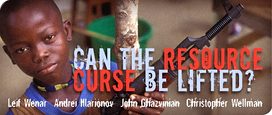There are some fascinating discussions going on here, and an embarrassment of riches when it comes to potential directions to take the conversation. One barely knows where to jump in. At the risk of being unimaginative, I’d like to return to a couple of the nuts-and-bolts practical questions I raised in my original reply. In particular, I’d like to posit a scenario and hear what you all think of this.
Let’s for a moment forget about Sudan, where American companies are already forbidden from operating. Let’s instead take Equatorial Guinea. We all agree this is one of the world’s most unpleasant governments. We all agree that “theft” is not an overly enthusiastic label to attach to the actions of Obiang. We don’t need Freedom House to tell us this. But who is actually buying Equatorial Guinea’s oil? The Chinese, to some extent, but largely it is the United States. And who are the oil companies operating in Equatorial Guinea? ExxonMobil, Amerada Hess, Marathon, and a host of smaller American independents account for virtually all of Equatorial Guinea’s exploration and production activity. And when that oil arrives in the United States, it is refined and sold as fuel for powering the American economy, or it makes its way into various stages of the American manufacturing industries.
Now, let us say we have just passed the Clean Hands Trust reforms that are being proposed. It is suddenly impossible to escape the conclusion that we here in the United States are producing products for export that have been made with “stolen” crude oil from Equatorial Guinea. So what now? Who is going to introduce a tariff on American products? Will it be the Chinese, who clearly are going to have worked up a nice healthy appetite for retaliatory action following the whopping tariffs we’ve just imposed on them over Sudan? Will it be Venezuela? Will it be a Russian government keen to make a political point about U.S. “hypocrisy”? Or, perhaps most worryingly, will it be some nice European government that — quite reasonably — is uncomfortable with the idea of one standard being applied to China and another one to the United States?
Perhaps I am being too much of a Chicken Little. I am prepared to accept Dr. Wenar’s point that this proposal is meant to provide incentives for good behavior, rather than create a world trade environment burdened by a host of new tariffs. Indeed, perhaps I am being unduly blinkered in my approach, and ignoring the fact that there is a clear moral imperative here. Perhaps I would feel differently if we were talking about actual human slavery here, and perhaps I am skeptical only because I happen to feel the “genocide” label is not an accurate one to apply to the situation in Darfur (but that’s clearly a separate discussion). However, I just can’t help feeling that, in the cold hard light of day, we are simply inviting an endless cycle of tit-for-tat tariffs introduced in a highly politically charged atmosphere in which every country has a slightly different idea of whose hands are and are not “clean.”
I also still think that once you start to move more than one or two steps away from the “scene of the crime,” as it were, it becomes very difficult to make a moral case for punishment. I admit I am way out of my depth talking about moral philosophy, though, and Kit Wellman will probably set me straight on that. Ultimately, I suppose, I tend to agree with Andrei Illarionov that if we can establish that someone has committed a crime, then we should make it our priority to find a way to punish the actual criminal — rather than devising a complicated scheme that is potentially disruptive to global trade, in an (admittedly noble) effort to punish the people buying and selling goods that happen to have been manufactured using some small element of “stolen” material. But again, I am prepared to be convinced that I am being overly cautious here.

